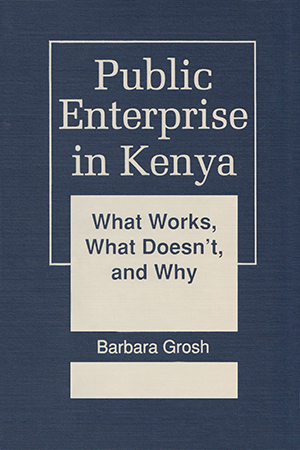
- 1991/223 pages
Public Enterprise in Kenya:
What Works, What Doesn't, and Why
Grosh uses four indicators (profitability, efficiency, prices paid to suppliers, and consumer prices) to assess which firms performed well, which had problems, and when and why those problems developed. Covering 1963-1988, data is provided for seventeen firms in the agricultural sector, four in finance, seven in transport and communications, and five in development finance. In addition, thirty publicly owned manufacturing firms are compared with forty private ones.
She concludes that neither privatization nor policies designed to bring firms and their managers under control—approaches gaining popularity with African policymakers—is likely to solve the problems. She concludes also, however, that most of the problems are susceptible to limited and feasible reforms, and that public enterprise performance can be improved.







